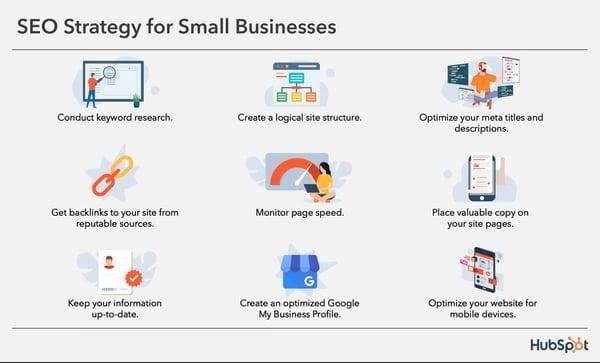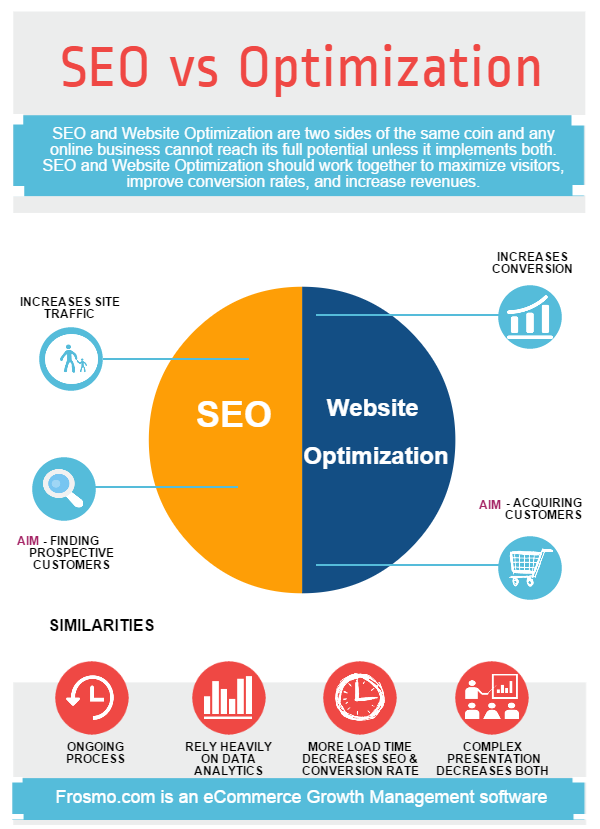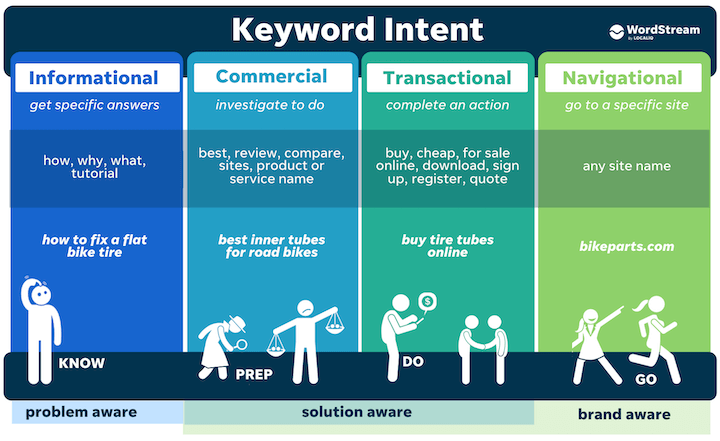Unlock the secrets to boosting your online presence and reaching more customers with our expert guide to SEO for SMBs.

Image courtesy of via DALL-E 3
Table of Contents
Introduction to SEO
If you own a small or medium-sized business, you may have heard about SEO. But what exactly is SEO, and why is it important for businesses like yours? In this section, we’ll explore the world of SEO in a simple and easy-to-understand way, explaining how it can help your business thrive in the online world.
What is SEO?
SEO stands for Search Engine Optimization. It’s like a magic tool that helps websites show up more often in search results when someone looks for something on the internet. Imagine if you had a shop and wanted more people to come in – SEO would be like putting up a big, bright sign outside your shop so everyone knows you’re there!
Why Do Small Businesses Need SEO?
For small businesses, having a good SEO strategy is crucial. It’s like having a secret weapon that can help you attract more customers online. When someone searches for products or services that you offer, you want your website to be one of the first few they see. That’s where SEO comes in – it helps you stand out in a crowded online marketplace.
How SEO Works
Search engines like Google use special algorithms to find the best and most relevant websites when someone searches for something. SEO is like giving your website a makeover to make sure these algorithms like what they see. By using the right keywords and optimizing your website in the right way, you can climb up the search rankings and reach more potential customers.
Keywords Basics
Keywords are the words or phrases that people type into search engines like Google when they are looking for something. When you search for “best pizza near me” or “how to tie a tie,” those are keywords. They help search engines understand what your website or content is about so they can show it to people searching for those words.
How to Find Good Keywords
When it comes to finding the right keywords for your business website, there are simple tools and methods you can use. One way is to think about what you would search for if you were looking for your products or services. You can also use tools like Google’s Keyword Planner to see what words people are searching for most often. By using relevant keywords on your website, you can help improve your chances of showing up in search results when people are looking for what you offer.
On-Page SEO
In the world of websites and search engines, on-page SEO plays a crucial role in helping your website rank higher in search results. Let’s dive into what on-page SEO is all about and how you can optimize various parts of your website to improve your online visibility.

Image courtesy of via Google Images
Title Tags and Headings
When someone searches for something online, search engines like Google look at the title tags and headings on your website to understand what your page is about. By including relevant keywords in your title tags and headings, you can help search engines connect your content with what people are looking for. Make sure to keep your titles and headings clear, descriptive, and engaging to grab the attention of potential visitors.
Using Meta Descriptions
Meta descriptions are short snippets that show up below your page title in search results. They provide a brief summary of what your page is about, enticing users to click and visit your site. By crafting compelling meta descriptions that include relevant keywords, you can improve your click-through rate and attract more visitors to your website.
Creating SEO-Friendly Content
Content is king when it comes to on-page SEO. Producing high-quality, relevant, and original content that incorporates targeted keywords is essential for improving your website’s visibility. Search engines love fresh and valuable content, so make sure to regularly update your website with new information that resonates with your target audience. Remember, the goal is to provide users with the best possible experience when they visit your site.
Optimizing Images
In order to boost your website’s visibility in search engine results, it’s crucial to optimize the images you use. Let’s dive into some key strategies for optimizing images to enhance your SEO.
Adding Alt Text to Images
Alt text, or alternative text, is a brief description of an image that is displayed if the image fails to load on a webpage. Including alt text not only improves accessibility for visually impaired users but also provides search engines with valuable information about the content of your images.
When writing alt text, be sure to accurately describe the image using relevant keywords. For instance, if you have a picture of a red bicycle on your website, your alt text could be something like “Red bicycle riding on a sunny day.” This descriptive alt text helps search engines understand the context of the image and can improve your chances of appearing in relevant search results.
Choosing the Right File Names
Optimizing your image file names is another important aspect of image SEO. When naming your image files, avoid generic names like “IMG_1234.jpg” and instead use descriptive, keyword-rich names that reflect the content of the image.
For example, if you have a picture of a delicious chocolate cake on your bakery website, a suitable file name could be “chocolate-cake.jpg” or “best-chocolate-cake-ever.jpg.” By incorporating relevant keywords into your image file names, you’re providing search engines with additional context about your images, which can ultimately improve your SEO performance.
Building Backlinks
Backlinks are like recommendations from other websites for yours. When another website links to your site, it’s like a vote of confidence that tells search engines your website is trustworthy and valuable. Building backlinks is an essential part of improving your website’s SEO and ranking higher in search results.

Image courtesy of via Google Images
What Are Backlinks?
Backlinks are links from other websites that direct users to your website. These links act as signals to search engines that your content is credible and worth showing to users. The more high-quality backlinks your site has, the more authority search engines will associate with your website.
How to Get High-Quality Backlinks
Getting high-quality backlinks takes time and effort, but it’s worth it for improving your SEO. Here are some tips to help you start building backlinks:
1. Create valuable and shareable content: When you produce high-quality and relevant content, other websites are more likely to link back to it.
2. Reach out to other websites: Connect with other websites in your industry and ask if they would be willing to link to your content if it adds value to their own.
3. Guest blogging: Writing guest posts for other websites in your niche is a great way to not only showcase your expertise but also secure a valuable backlink back to your site.
4. Utilize social media: Sharing your content on social media platforms can help attract attention and encourage others to link back to your website.
By consistently working on building backlinks from reputable and relevant sources, you can boost your website’s authority and climb higher in search engine rankings.
Local SEO
Local SEO is like putting up a virtual signpost that guides people right to your small business’s door when they search online. It helps you stand out in your neighborhood or city, making it easier for local customers to find you. Let’s dive into the world of local SEO to see how it can benefit your small business!
Setting Up Google My Business
Google My Business is your business’s online headquarters where you can manage how you appear on Google, including Search and Maps. It’s like having your own digital storefront on the world’s largest search engine. By creating and optimizing your Google My Business profile, you can provide essential information like your address, phone number, business hours, and even customer reviews. This helps boost your visibility in local searches and makes it simple for potential customers to learn more about what you offer.
Finding Local Keywords
Local keywords are like secret codes that help search engines connect you with people looking for products or services in your area. By including specific local terms in your website content, such as your city, neighborhood, or nearby landmarks, you can attract nearby customers who are ready to buy. Discovering the right local keywords for your business involves understanding what your local audience is searching for and integrating those terms naturally into your website. This way, when someone in your area searches for what you provide, your business is more likely to appear at the top of the results!
Measuring SEO Success
Tracking the success of your SEO efforts is crucial to understanding what is working well and where you may need to make adjustments. By using specific tools and metrics, you can gain valuable insights into how your website is performing in search engine results.

Image courtesy of via Google Images
Using Google Analytics
Google Analytics is a powerful tool that allows you to track various metrics related to your website’s performance. By integrating Google Analytics into your website, you can monitor important data such as the number of visitors, the most popular pages, and how users interact with your site.
With Google Analytics, you can also track the sources of your website traffic, whether it’s from organic search, referral links, or social media. This information can help you understand which channels are driving the most traffic to your site and where you may need to focus your efforts.
Understanding SEO Metrics
When measuring SEO success, there are several key metrics to keep an eye on. These metrics can provide valuable insights into how well your website is optimized for search engines and how effectively your SEO strategies are performing.
Some important SEO metrics to monitor include:
– Organic Traffic: This shows you how many visitors are coming to your site through search engine results.
– Keyword Rankings: Keep track of where your website ranks for important keywords related to your business.
– Click-Through Rate (CTR): Monitor how often users click on your website in search results.
– Bounce Rate: This indicates the percentage of visitors who leave your site after viewing only one page.
By regularly reviewing these metrics and making adjustments to your SEO strategies based on the data, you can continue to improve your website’s performance and attract more organic traffic.
Common SEO Mistakes to Avoid
One common mistake that businesses make is ignoring mobile optimization. In today’s digital age, more and more people access websites through their mobile devices. If your website is not mobile-friendly, it can hurt your SEO ranking. Search engines like Google prioritize mobile-friendly websites in their search results because they want to provide the best user experience for mobile users.
Keyword Stuffing
Another mistake to avoid is keyword stuffing. Keyword stuffing is the practice of excessively using keywords in your content in an attempt to manipulate your site’s ranking in search results. This can actually harm your SEO efforts as search engines can penalize websites that engage in this practice. It’s important to use keywords naturally in your content and focus on providing valuable information to your audience.
Not Using Analytics
Lastly, not using analytics to track your SEO performance is a crucial mistake to avoid. Analytics tools like Google Analytics can provide valuable insights into how your website is performing, which keywords are driving traffic, and where improvements can be made. By regularly monitoring your SEO metrics, you can make informed decisions to optimize your website and improve your search ranking.
Conclusion
In conclusion, SEO is a powerful tool that can greatly benefit small and medium businesses by helping them increase their online visibility and attract more customers. By optimizing their websites for search engines, businesses can improve their rankings in search results and reach a wider audience. Through the use of keywords, on-page SEO techniques, image optimization, building backlinks, local SEO strategies, and monitoring SEO metrics, businesses can enhance their online presence and drive more traffic to their websites.

Image courtesy of via Google Images
It is essential for small and medium businesses to understand the importance of SEO in today’s digital landscape. With the right strategies and tactics in place, businesses can achieve SEO success and stand out from their competitors. By avoiding common SEO mistakes and staying informed about best practices, businesses can harness the power of SEO to grow and thrive in the online world.
Want to turn these SEO insights into real results? Seorocket is an all-in-one AI SEO solution that uses the power of AI to analyze your competition and craft high-ranking content.
Seorocket offers a suite of powerful tools, including a Keyword Researcher to find the most profitable keywords, an AI Writer to generate unique and Google-friendly content, and an Automatic Publisher to schedule and publish your content directly to your website. Plus, you’ll get real-time performance tracking so you can see exactly what’s working and make adjustments as needed.
Stop just reading about SEO – take action with Seorocket and skyrocket your search rankings today. Sign up for a free trial and see the difference Seorocket can make for your website!
Frequently Asked Questions (FAQs)
What is SEO in Simple Terms?
SEO, or Search Engine Optimization, is like a secret code that helps websites show up more when people search for things online. It’s like putting up signs so that search engines like Google can find the website easily and show it to more people.
How Long Does SEO Take to Work?
SEO is like planting seeds in a garden. It takes time for the seeds to grow into flowers. Similarly, SEO takes some time to work its magic. It can take a few weeks to a few months to see good results, so patience is key!
Is SEO Expensive?
SEO doesn’t have to be expensive, especially for small businesses. There are many simple and budget-friendly ways to improve SEO, like using the right keywords and creating helpful content. It’s more about being smart and strategic rather than spending a lot of money.







